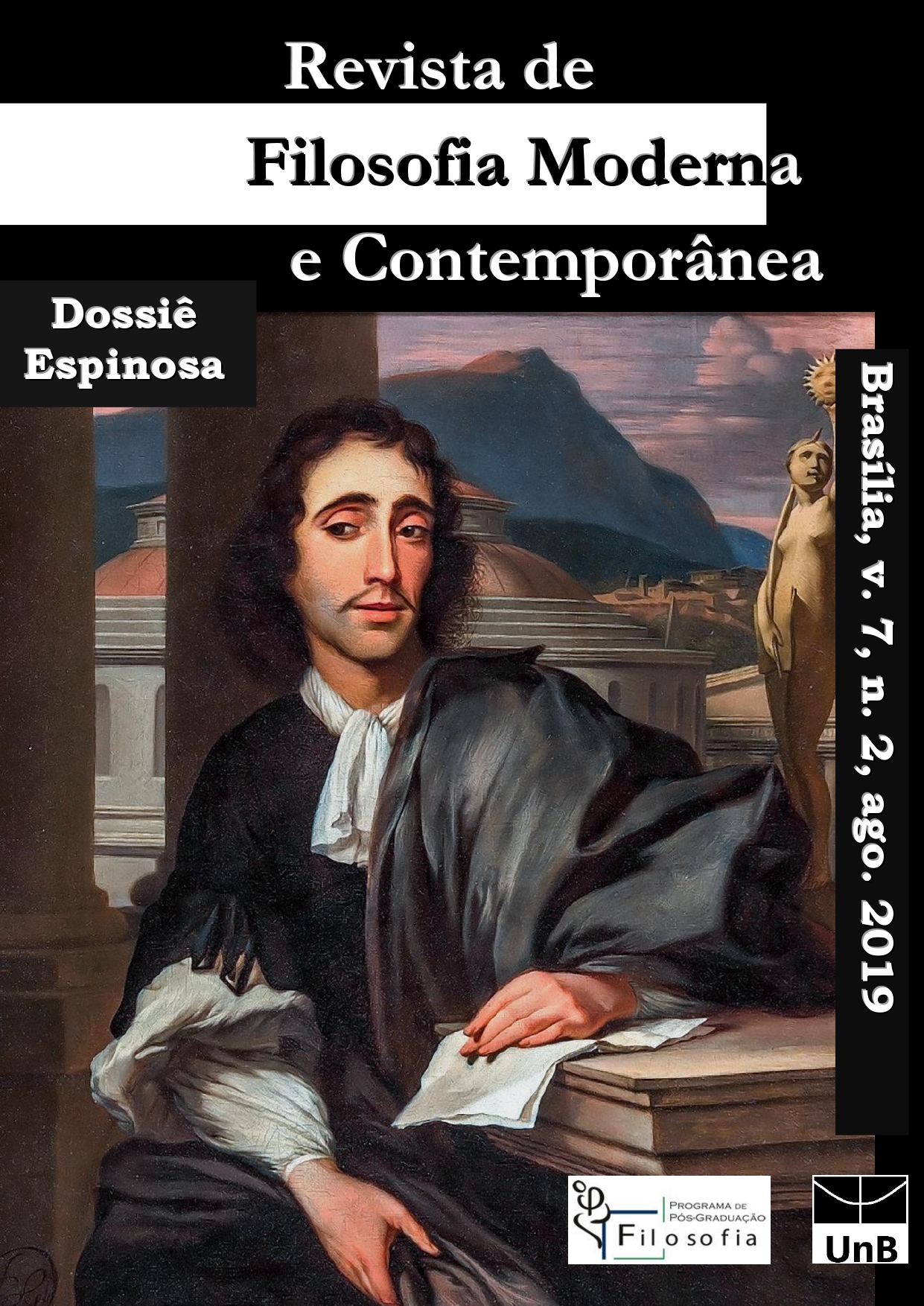Is There Oneself Abstract in the Origin of all Abstraction in Spinoza's Philosophy?
DOI:
https://doi.org/10.26512/rfmc.v7i2.25586Keywords:
Abstraction, SpinozaAbstract
Inserted in the historical context of the critique concerning the abstractions, Spinoza retakes the early modern tone of his own time and elaborate several warnings against abstraction itself. Nevertheless, the Spinozian critique shifts considerably from his contemporaries, whereas he also criticizes some of the philosophers that stand against the concept of abstractions. We believe, notwithstanding, that Spinoza’s distinctiveness occurs because he consider abstraction not only as some epistemic methodology, namely, the act of select, divide and disintegrate the objects of knowledge, neither the arbitrary foundation of principles for knowledge through the interference of Will in the Intellect, but rather as the productive mental force when it is not within itself, therefore, when the productive mental force isn’t what it should be as it naturally is; in other words: when the mind has not the consciousness of its own making ”” it’s precisely this what we call self-abstraction. As if it were not enough, our article aims to approach this hypothesis and elaborate how exactly the concept of self-abstraction can help us comprehend some of the Spinozian thesis, so that we may focus on the rhetorical hypothesis that opens the Theological-Political Treatise.
Downloads
References
AGOSTINHO, S.Verdadeira Religiãotrad. Nair de Assis Oliveira. 2ª Ed. SãoPaulo: Editora Edições Paulinas, 1987.
AKKERMAN, Fokke.Le caractère rhétorique du Traité théologico-politique,inSpinoza, entre lumières et romantisme. Les cahiers de Fontenay, nº 36a 38, mars 1985, p. 381-98.
ARNAULD, A. & NICOLE, P. Lógica ou a arte de pensar. Trad. Nuno Fonseca. 1 edição, Lisboa: Fundação Calouste Guilbenkian; 2016.
BACON, F. Novum Organum ou Verdadeiras Indicações Acerca da Interpretação da Natureza in Coleção Os Pensadores. Trad. e Notas de José Aluysio Reis de Andrade. São Paulo: Editora Nova Cultural, 1999.
BOÉCIO. Consolação da Filosofia. Trad. Willian Li. 2º Edição. São Paulo: Martins Fontes, 2012.
BURTON, R. Anatomia da Melancolia Vl I. Tradução de Guilherme Gontijo Flores. Curitiba: Editora UFPR, 2013.
CÉSAR, J. V. Abstrato ou concreto?Revista Letras; vl 9, 1958; p. 24-34.
CHAUI, M.A Nervura do Real ”“ Tomo I. São Paulo: Companhia das Letras,1999.
_____. Introdução à leitura de Espinosa. Tese de Doutoramento apresentada à Faculdade de Filosofia, Letras e Ciências Humanas da Universidade de São Paulo. São Paulo, 1970.
_____Da Realidade Sem Mistérios ao Mistério do Mundo (Espinosa, Voltaire, Merleau-Ponty). Ed. Brasiliense, Madrid e São Paulo 1981.
ESPINOSA. Ética. Tradução do Grupo de Estudos Espinosanos. Coordenação Marilena Chaui. São Paulo: Editora Edusp, 1ª Ed, 2015
_____. Breve Tratado de Deus, do Homem e do seu Bem-estar. Pref. Marilena Chaui. Intr. Emanuel Angelo da Rocha Fragoso, Erika Itokazu. Trad. enotas Emanuel Angelo da Rocha Fragoso e Luis César Guimarães Oliva.Belo Horizonte: Autêntica Editora 2012.
_____. Princípios da Filosofia Cartesiana e Pensamentos Metafísicos. Trad. Homero Santiago e Luis César Guimarães Oliva. Belo Horizonte/SãoPaulo: Autêntica Editora, 2015.
_____. Tratado Teológico-Político. Trad. introd. e notas de Diogo Pires Aurélio. São Paulo: Martins Fontes, 2003.
_____. Correspondencia. Trad. Introd. notas e In. de Atilano Domínguez. Madrid: Alianza Editorial, 1998.
_____. Tratado da Emenda do Intelecto. Trad. Cristiano Novaes de Rezende. Campinas: Editora da Unicamp, 2015.
_____. Spinoza Obra Completa Vl II: Correspondência Completa e Vida. Org. J. Guinsburg, Newton Cunha e Roberto Romano. Trad. e Notas J. Guinsburg e Newton Cunha. São Paulo: Editora Perspectiva, 2014.
NEWLANDS, S. Reconceiving Spinoza. 1ª Edição. New York: Oxford University Press; 2018.
_____. “Spinoza’s Early Anti-Abstractionism” In: MELAMED. Y. Y. The Young Spinoza: a metaphysician in the making. 1º edição. New York: Oxford University Press; 2015. p. 255-71.
SANTIAGO, Homero. Geometria do Instituído ”” Estudo sobre gramáticahebraica espinosana. Fortaleza: Editora UECE., 2014.
LÃVIO, Teixeira. A Doutrina dos Modos de Percepção e o Conceito de Abstra-ção na Filosofia de Espinosa. Editora UNESP. São Paulo, 2001.
REZENDE, C. N. "O Estatuto das Hipóteses Científicas na Epistemologia de Espinosa". Cadernos de História de Filosofia e Ciência, Campinas, Série3, v. 18, n. 1, jan.-jun. 2008. p. 147-71.
_____. Os Perigos da Razão Segundo Espinosa: A inadequação do terceiro modo de perceber no Tratado da Emenda do Intelecto. Cadernos de História de Filosofia e Ciência, Campinas, Série 3, v. 14, n. 1, jan.-jun.2004. p. 59-118.
_____. A gênese textual da doutrina da educação das crianças no Tratado da Emenda do Intelecto de Espinosa. Filosofia e Educação, volume 5, Nº 1, abril ”“ setembro de 2013. p. 52-110.
ZATERKA, L.A. Filosofia Experimental na Inglaterra do Séc. XVII: Francis Bacon e Robert Boyle. São Paulo: Humanitas, 2004.
Downloads
Published
How to Cite
Issue
Section
License
Copyright for articles published in this journal is retained by the authors, with first publication rights granted to the journal. By virtue of their appearance in this open access journal, articles are free to use, with proper attribution, in educational and other non-commercial settings.


